Crying is the most powerful way for a baby to attract the attention of others, he tells them that the child is: tired, sick, hungry. Crying, the baby signals that he needs help.
The crying of a baby has many meanings, and over time, the mother understands why the baby is crying and will definitely come to the aid of the baby.
The main causes of crying in young children are:
- hunger;
- intestinal colic;
- cold or heat;
- pain;
- fatigue;
- lack of attention and communication;
- wet diapers, diaper rash.
Harsh crying in the baby
In the first month of life, the baby cries less often, due to the immaturity of the nervous system, and only such strong stimuli as hunger, pain or fear can provoke this powerful element of the child's adaptation to new living conditions.
The main task of parents is to provide the baby with comfortable living conditions. Especially contraindicated for a newborn and baby in the first months of life:
- bright light;
- a sharp loud sound (shout, knock);
- constantly working TV or other sound-reproducing equipment.
A small child may cry, experiencing difficulty falling asleep, fatigue, pain, hunger.
Hunger as the reason for crying
Hunger is considered the most common cause crying babies under 3 months.
“Hungry” crying differs from other types of crying easily: the baby begins to cry after a certain time after feeding, while making sucking movements with his mouth, stretching out his arms and “catching the chest”. Crying is demanding, it is loud and persistent. Usually, crying from hunger occurs with untimely feeding or with a lack of milk in the mother (hypogalactia) of various origins.
If crying is caused by hunger, the baby will calm down after feeding.
To date, the main WHO recommendations on feeding, especially for newborns and children in the first months of life (up to 6 months), are feeding at the request of the child, and not by the hour. But at the same time, parents should not forget about other reasons for the crying of the child, offer the breast, but do not insist, especially if little time has passed after feeding. Usually, with normal lactation and sufficient time for the baby to be at the breast, he will want to eat no earlier than 1.5-2 hours, and overfeeding leads to regurgitation and increased intestinal colic. If the baby often asks for breasts, you need to contact the pediatrician and determine the cause of the “hungry” cry.
Fatigue
Babies up to 3 months sleep from 18 to 20 hours and this is due to physiological fatigue due to hyperexcitability of the nervous system. Crying is considered the main reaction to fatigue, both physical and psycho-emotional. The more tired the baby is, the longer and stronger baby will cry. The hallmark of fatigue crying is first losing interest in the world around you, then whimpering, moving restlessly, and then crying out loud. It is important to know that the baby can not always calm down and fall asleep. The baby must be picked up, calmed and lulled. Also, children quickly calm down in the fresh air. At the first signs of fatigue, you can try to bathe the baby - in most cases, water has a calming effect on the child, the baby quickly calms down and falls asleep. You can add a few drops of valerian tincture to the water, bathe the baby in decoctions of herbs - mint, chamomile, calendula. But if you are too tired, you can’t bathe a child - this will lead to overexcitation of the nervous system.
Lack of communication
Infants are in dire need not only of care and food, but also of communication. The need for communication is an important quality, and in its absence, the full development of the child's emotional sphere and intellect is impossible, and he does everything to attract the attention of an adult, especially close contact with his mother.
With a lack of communication, the crying and crying of the baby is not associated with unpleasant sensations, and as soon as the baby seeks the attention of an adult, he immediately calms down.
Heat or cold
Often the child cries, experiencing discomfort from overheating or hypothermia of the baby, due to the immaturity of the thermoregulation system.
If the baby is hot, reddening of the skin is noted, the baby begins to whimper, thrash around in the crib, releasing the arms and legs, and then cry loudly. Crying intensifies with the appearance of red spots on the skin - prickly heat and with an increase in body temperature.
If the baby is cold, his crying at first has a sudden and piercing character, the cry gradually turns into a whimper with the addition of hiccups. At the same time, the arms, legs and nose of the baby are cold, and the skin on the back and chest is cool. Parents need to create comfortable conditions for the child, and this is the prevention of both colds and overheating, and any discomfort of the child.
Crying in a dream in a baby
Anxiety in a baby in a dream can cause:
- uncomfortable sleep conditions (uncomfortable posture, prolonged pressure on the skin of folds of clothing or underwear, heat or cold);
- intestinal colic;
- wet clothes and diaper rash;
- pain syndrome (pain in the ear, teething, stomatitis).
In the first month of life, the right choice of clothes and bedding is important (they must be made from natural materials, without synthetic additives), constantly level the bed, turn the baby over.
Wet clothes constantly irritate the skin, redness, itching of the skin, diaper rash and small wounds appear on it.
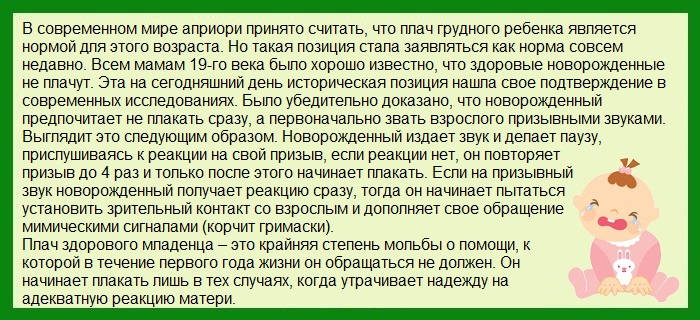
Strong crying in the baby
Intestinal colic is considered the second most common cause of baby crying. They arise in connection with the immaturity of the enzymatic systems of the baby, the development of allergic reactions, and malnutrition of the nursing mother. At the same time, gases accumulate in the intestines of the baby, which irritate the intestinal walls, causing it to bloat and pain.
In this case, the crying of the child is paroxysmal, intermittent. The baby cries out and starts crying, calming down for short periods of time. While crying, the baby pulls the legs to the stomach. Feeding does not eliminate, only exacerbates the scream, sometimes the child begins to scream immediately after feeding.
In modern pediatrics, step therapy for intestinal colic in infants is used, which is a set of measures for background correction and measures to eliminate a pain attack.
Background correction methods include:
1. Proper feeding;
2. The use of herbal and other preparations (plantex, decoction of fennel, espumizan, bobotik, baby kalm, babynos);
When colic occurs:
- take the child in your arms, pressing your tummy to your body;
- put a warm dry compress, heating pad, warm diaper on the baby's stomach;
- bathe the baby in a warm bath with decoctions of herbs and valerian;
- massage the baby's tummy clockwise with a warm palm;
- use a gas outlet pipe;
- after feeding, it is necessary to hold the baby in an upright position.
Proper nutrition of a nursing mother is important for preventing the development of intestinal colic.
Other causes of pain
Crying babies are often caused by a pain syndrome that can occur with stomatitis (thrush), inflammation of the ear (otitis media), at the onset of a viral infection or the first signs of a cold due to sore throat, inflammation of the ligaments of the larynx, nasal congestion.
Thrush (stomatitis) manifests itself in the form of a white film, inflammation of the mucous membranes and the appearance of ulcers, so the baby, experiencing anxiety and pain, especially when feeding, due to pain during sucking and irritation of the mucous membranes. The baby cries and refuses the breast.
With otitis, there is a sharp soreness when swallowing and pain in the ears at night. The crying of the baby becomes strong, piercing and inconsolable.
With any appearance of a strong cough in a baby, parents should immediately seek medical help to determine the cause and prescribe timely and adequate treatment.
Why is she crying infant: determine and eliminate the cause
Visitor Rating: (6 Votes)
Digestion in a newborn in the first time after birth is only being formed. Weakness digestive system causes colic and spasms. Feeding gives the baby pain and discomfort. But there are other reasons why a baby cries while feeding.
Why does a baby cry while breastfeeding
During lactation, a woman should strictly monitor the quality of her own diet. Every woman in labor knows that carbonated drinks contribute to the formation of gas in the intestines of a newborn, and spicy foods change the taste of milk. Spices and vegetables with a pronounced taste (for example, onions, garlic, peppers) change the taste of milk, so the baby expresses anxiety and dissatisfaction with crying. Crying and screaming is the only way an infant communicates that cannot express anxiety in words.
When eating, a newborn may cry if he swallows a lot of air. The air causes pain in the stomach, so after feeding the baby should be lifted vertically, slightly pressed against you until you burp.
One of the most common causes of crying is abdominal pain. When in pain, the child screams loudly, draws his legs to his stomach, arches his body. The elimination of pain should be associated with a decrease in the amount of gases in the baby and the search for concomitant causes.
Crying can also be caused by the amount of milk a mother has. With increased lactation, the child chokes, milk enters his nose. With a lack, it is difficult for a child to suck breast milk, the baby cannot satisfy hunger and is anxious.
![]()
Crying with artificial feeding
When feeding from a bottle in an infant, as well as when breastfeeding, gases may form. In addition, artificialists may worry about inflammation of the oral cavity. Mother's milk increases the immunity of the baby and protects his body in a natural way. In children on artificial feeding there is no such natural barrier against microbes; an industrial mixture does not have such a quality. Inflammation of the oral cavity (thrush, stomatitis) can be complicated by pharyngitis, ear pain, nasal congestion. All these symptoms require a consultation with a pediatrician.
Nasal congestion can be both a symptom of a cold and a consequence of poor hygiene. The crusts in the nose interfere with the inhalation of oxygen, the baby is uncomfortable trying to both breathe and drink from the nipple. In order to avoid the formation of crusts, the baby's nose is cleaned daily with cotton flagella (not cotton swabs!), Soaked in petroleum jelly.
When feeding, a newborn may have a headache (for example, due to intracranial pressure, hydrocephalic syndrome.). The pain is aggravated by swallowing food. With headaches, a newborn usually spits up food in a fountain.
Crying can also be associated with teething. Before the appearance of the first tooth, the gum is usually inflamed, the child scratches it with a toy or a mother's finger. The reason may be in a short bridle. Such a problem can be noticed by a pediatrician.
There can be many reasons why a baby cries while feeding. But special attention deserve health problems. If the baby is sick, he will not calm down from applying to the nipple. Healthy child He eats with appetite, and after feeding he immediately falls asleep.
Another reason why a baby cries when he eats is that he does not like the taste of the mixture. The reason may be in an improperly prepared mixture. It must be kneaded strictly according to the instructions, adhering to the dosage.
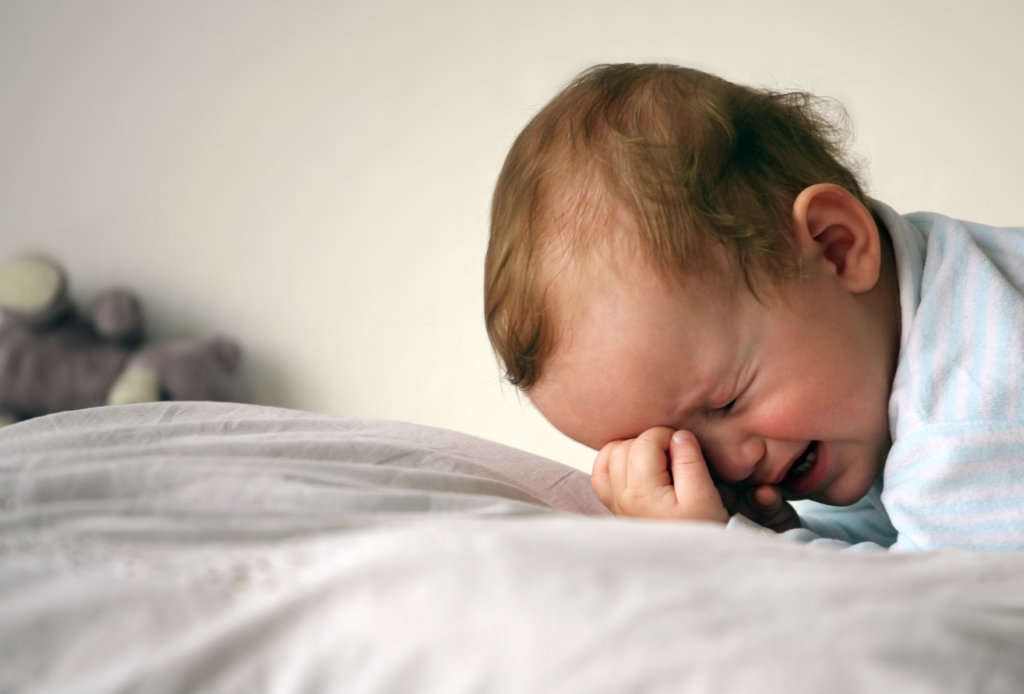
Feeding mistakes
It is wrong to assume that when a child cries, he is hungry. Many young mothers immediately try to give a crying baby a breast or a bottle. But there are many more reasons why a baby cries. He can be cold, wet, scared. Therefore, in addition to physiological reasons, psychological ones should also be taken into account. Harsh sounds and noises during feeding scare the baby, he refuses to eat and cries.
Improper feeding gives the baby a huge inconvenience. The baby cries if it cannot take the breast correctly. This is due to early pacifier training, as well as alternate feeding from a bottle, then breastfeeding. When feeding with a bottle, the newborn has to make less effort, the mixture practically flows into the child's mouth on its own. At breastfeeding The baby has to work harder. If it is not possible to suckle the breast, the baby is nervous and screams. Mothers should make sure that the child captures both the nipple and the halo around it with his mouth.
Pediatricians and obstetricians have already recognized the untenable system of feeding by the hour. With this practice, the child is offered food either when he has managed to get hungry well, or when he is still full. Feeding on demand is optimal. Already a few days after the birth, the mother can tell how long after the last meal the newborn wants to eat again.
Additional measures
From colic in the first months of life, dill water and special preparations to reduce gas formation help. If your baby cries while feeding, he may be constipated. To facilitate bowel movements, it is worth massaging the tummy with gentle circular movements in a clockwise direction. If the child has not defecated for several hours, you can stimulate the anus with a cotton swab lubricated with baby cream. The stick should gently irritate the anus until the child poops. However, constant supportive measures lead to the fact that the child cannot then go to the toilet without assistance. Therefore, such measures are resorted to in emergency cases. For the same reason, cleansing enemas should not be used frequently.
The reasons why the baby cries may be in an uncomfortable environment. Too dry air in the room dries the nasal mucosa, causes headaches. Periodically, you need to ventilate the children's bedroom, taking the child to another room for a while.
You can not feed a screaming baby - this is how the baby swallows air, he will be tormented by colic and bloating. First you need to try to calm the baby, and then offer him food.
Constant crying not only during feeding, but also in between them, as well as in a dream, is a reason to be examined by a doctor.
Parents of young children are often faced with the problem of crying babies. Often they cannot figure out the reasons and understand why the baby is crying. This may be due to different situations, because the baby is not yet able to express his emotions and needs. His only means of communication is crying. In this way, babies can show that they are hurt, scared, lonely. Babies cry for a variety of reasons, some of which require the attention of a doctor.
Why is the baby crying
In the first months of a child's life, it is very difficult to determine why the baby is crying: either he is just being naughty, or he wants attention, or something hurts him. Over time, most mothers learn by the type of crying to identify the problem that caused it:
- Normal crying, gradually getting louder. He can say that the baby is hungry. You can check this by lightly touching the corner of the child's lips, if the baby opens his mouth and turns his head to his finger, then he wants to eat.
- A low whimpering cry accompanied by restlessness usually indicates discomfort. In this case, it is worth checking the child’s clothes and diaper, perhaps something is pressing or rubbing on him.
- Prolonged whimpering may indicate that the baby is cold or hot.
- With sharp loud cries, the child expresses pain. Such crying can occur with intestinal colic.
- Constant crying that prevents the baby from eating and sleeping can be associated with teething, which is accompanied by pain and itching in the gums. Special gels and teethers can help the baby reduce discomfort.
- Continuous crying with varying volume in the evening indicates that the child is overexcited and unable to fall asleep on its own. In such cases, you need to try to calm him down, vilify him in your arms, shake him.
- A soft squeak that is periodically replaced by a loud cry may mean that the baby needs attention. At the same time, at first the baby does not cry too loudly, but gradually his cries intensify.
Why do babies cry in their sleep
If a baby often cries in a dream, then it is necessary to check his sleeping place. Maybe something is keeping him from sleeping properly. In addition, crying during sleep can be a sign of colic or teething (the first teeth may begin to erupt after 3-4 months). By screaming and crying, a child can show his fear. Often children cry simply because their mother is not around. If the baby cries constantly, then you should consult a doctor. In cases where there are no pathological causes of crying, and it is caused by the absence of the mother, it may be worth considering co-sleeping.
Why does a baby cry before going to bed
The reason that the baby cries before going to bed may be overexcitation or overwork. Since the baby's body is still too weak, and the nervous system is not fully formed, he gets tired and tired very quickly. If the baby is tired or overexcited, then he cannot fall asleep, even if he really wants to. To cope with this problem, first of all, you need to organize a sleep schedule for the baby, which should be performed daily. In order for the child to fall asleep faster and better, it is worth preparing a room for him, after ventilating it and hanging the window. A quiet, calm song or reading a book will help calm the baby before going to bed.
Why does a baby cry while feeding
During feeding, the baby may cry due to discomfort and pain. This may be due to inflammatory diseases of the oral cavity, such as thrush, stomatitis and others, infectious pathologies of the ears, throat, nose. Also, the cause of crying when eating can be erupting teeth or colic. In some cases, crying and rejection of the breast is caused by a change in the taste of milk. This usually occurs with improper breast hygiene and the use of strong pungent foods by the nursing mother, such as onions, garlic, hot spices, and others.
Why does a baby cry after feeding
Most common reason for crying baby colic after feeding. Especially often their attacks torment the baby in the evening. Colic occurs when gas builds up in the baby's tummy. They are accompanied by arching the child's body, pressing the legs to the stomach, strong hysterical screaming and crying. To help the baby cope with colic, you can use a light massage of the abdomen, gymnastics, special children's preparations, fennel teas and other means.
Why does a baby wake up crying
A small child may wake up crying for a variety of reasons. The most common of these are: hunger, pain, lack of attention, a wet diaper or diaper, an uncomfortable bed. If the child has eaten too little or slept longer than usual, he may wake up hungry. In this case, he first begins to whimper, then the cry intensifies and turns into a cry. It is also common for children to wake up with discomfort after peeing or pooping. Toddlers, accustomed to increased attention to themselves, often immediately begin to cry after waking up.
Why does a baby cry when he wants to pee
Many babies cry before peeing. This shouldn't cause concern, but it shouldn't go unnoticed either. Most often, the cause of such crying is physiological. However, infectious diseases of the genital organs and urinary tract are also possible, especially with a lack of hygiene. Therefore, if the child constantly and strongly screams when he wants to write, or his temperature rises, you should immediately consult a doctor.
Why does a baby cry all the time
The constant crying of a baby can be caused by infantile colic or teething. In the first case, to help the baby, you can use the vent tube (but not too often), give him a massage, do gymnastics with him. To prevent colic after feeding, you need to hold the baby in an upright position for some time. When teething, to alleviate the condition of the crumbs, he can lubricate the gums with special ointments.
Why does a baby cry when pooping
Cracks in the anus can become the reason for crying babies during bowel movements. They lead to pain and unpleasant sensations when the baby is pooping. The problem develops, as a rule, against the background of frequent constipation. With cracks in the anus during defecation, the child groans, frowns, pushes hard and cries.
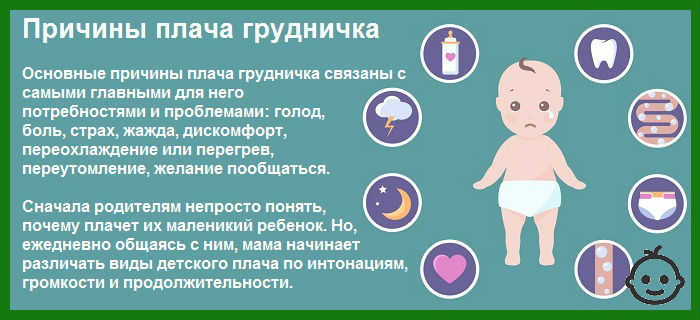
Why does a baby cry while bathing
The reasons that breast baby crying when bathing, maybe a few. The main ones are:
- incorrect water temperature - too hot or too cold (ideally, the water should be around 37 degrees);
- fright - young children are often afraid of the bathing procedure itself, so all actions must be carried out smoothly and calmly;
- parental insecurity;
- the presence of wounds, scratches, diaper rash, insect bites and other skin lesions in the crumbs.
A child appeared in the house: cute, smiling and so small! You involuntarily want to protect and protect him from everything in the world, but sometimes it is difficult for a mother to help a baby, it is especially difficult to figure out why a baby is crying. Some grandmothers say: “Let him scream - he develops his lungs!”. But this approach is by no means correct. It is imperative to understand the cause of children's crying and find a solution.
Children's cry as communication
A child's cry broke the silence - was born new person. All expectant mothers are looking forward to the first cry and rejoice when they hear it. And the absence of a cry, on the contrary, makes you worry and wonder if everything is in order. Screaming means everything is fine: this logic only works at the birth of a baby. Healthy young children whose needs are fully met do not cry for no reason.
Young children cannot talk, and crying is often the only way to express their needs. But how to understand what exactly the child wanted to “say” with the help of crying? An interesting way to understand why a baby is crying was proposed by Spanish scientists. They advise looking into the baby's eyes. If they are open, then the child is angry or scared, and if the eyes are closed, then it hurts.
Also, experts advise to look at the facial expressions of the baby and the nature of crying. An angry child cries loudly and sobbing, gradually calming down. When sick, crying can drag on for several hours. The child will not only not calm down over time, but will start crying more.
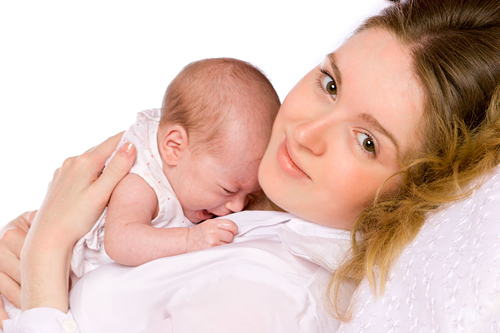
Objective causes of baby crying
A child may cry for various reasons. Some of them are easy to "calculate", others need to be guessed. But every mother should know what baby crying can mean. Here is a list of the most objective causes of baby crying:
- Hunger. The crying of a hungry child is accompanied by special movements and grimaces: he pulls his hands to his mother, smacks his lips and turns his head from side to side, looking for breasts.
- The child wants to sleep. relatively few. Basically, he sleeps - this is necessary for the development and processing of the information received. If the baby's mood changed dramatically, and he began to cry, not responding to attempts to distract and cheer him up, it is worth putting the child to bed.
- Wet diaper. Even disposable diapers sometimes cause a lot of anxiety in children when they get wet, not to mention reusable gauze diapers. Crying because of a wet diaper is accompanied by leg movements, so the baby is trying to get rid of it (knocking legs).
- Overwork. If the child began to cry for seemingly no reason, it is possible that he received too much information and was overworked. Crying, he signals the desire to rest. This often happens after the arrival of guests.
- The child is sweaty or cold. If the baby is crying, check if the ambient temperature is comfortable for him. If the nose and hands are cold, the baby is cold. And if he blushed, he had sweating - it means that he overheated. This discomfort can also cause children to cry.
- Colic. Colic is caused by gas in the intestines. characteristic feature crying due to colic is pulling the legs up to the tummy. Also, as a rule, colic occurs at the same time. Then the baby starts crying.
- Teeth are cutting. Teeth begin to erupt at the age of 6 months. In some children, this unpleasant process is painless, in others, on the contrary, it is accompanied by severe pain. At the same time, the child shows anxiety, constantly cries, pulls everything into his mouth and loses his appetite.
- Uncomfortable clothes. The crying of the baby may be due to the narrow elastic band on the sliders, bulging buttons, hard seams, lightning, which can pinch the baby's delicate skin. It is necessary to check whether all things are comfortable and whether they cause discomfort to the child.
- Weather change. Young children are exposed to weather anomalies: magnetic storms, sudden changes in temperature and pressure, and others.
- Lack of attention. Sometimes children just want to feel that their mother is there. Their crying is a kind of call. Crying due to lack of attention disappears as soon as the mother takes the child in her arms. Attempts to put him in the crib are accompanied by new crying.
- Pain. The crying of a child caused by pain is the most dangerous. A sick baby cries constantly. Because of the pain, the child often wakes up at night, shuddering sharply, and crying loudly. It is advisable to contact a pediatrician, especially if the parents can know the reason why the child fell ill (cold, fell, poisoned).
- Inflammation in the urinary tract. In this case, the child cries before peeing. An increase in temperature can also be an indicator.
- Irritation of the anus. IN this case the baby will cry when having a bowel movement. The reasons for this may be improper or insufficient hygiene, inaccurate insertion of a gas outlet tube or suppositories into the anus.
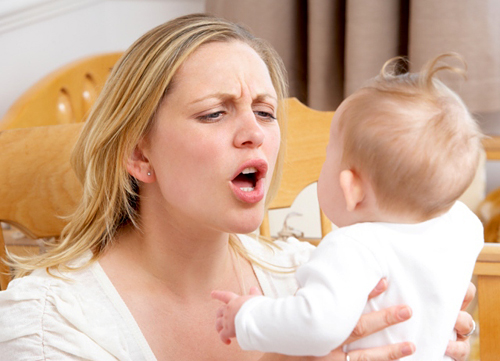
Why does the baby cry during feeding?
Separately, I would like to consider the crying of the child during feeding. As a rule, such behavior of a newborn often scares the mother. She fears that he will refuse to breastfeed altogether. Moreover, the well-established process of breastfeeding is extremely important both for the health of the baby and for the health of the mother.
Consider the reasons for the crying of the child during feeding:
- Pain in the mouth. It occurs due to stomatitis (thrush) or pharyngitis. Thrush can be identified by the white film that appears in the baby's mouth. With pharyngitis, the baby has difficulty swallowing due to a sore throat and cries.
- Otitis. This disease is accompanied by pain in the ears when swallowing. So hungry Small child literally pounces on the chest, but at the first sips comes in crying.
- Hot milk. For this reason, the child can take the breast, then throw it, cry, take it again, throw it ... Milk becomes unpleasant in taste if the mother has eaten onion, garlic or spicy food.
- "Rapid" milk. When milk fills the breast, its flow becomes too strong. The baby is choking and for this reason is crying.
- Lack of milk. If there is not enough milk, the baby sucks hard at the breast, but does not gorge. This makes him angry and he cries.
- neurological disorders. One of them is hydrocephalic syndrome. In this case, when swallowing, the child experiences headaches. You should immediately consult a doctor.
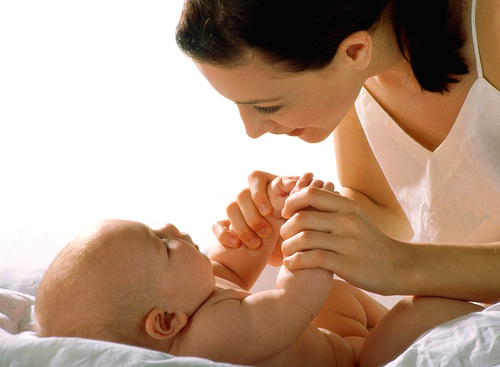
In order for the child to calm down, you need to find out the reason for his crying - that is, what he asks for - and eliminate it. It is clear that if the baby is hungry, he needs to be fed, if the child cries before sleep or is overtired, put him to bed. A wet diaper should be replaced with a dry one, and the baby should be washed and smeared with cream on the ass. A frozen baby will fall asleep as soon as it warms up: change clothes or lie down together under the covers and warm the baby with the warmth of your own body. If the child is sweating, wipe it with a damp swab and change into lighter clothes.
To save a child from colic, several measures should be taken to prevent colic and prevent their occurrence:
- Adjust ;
- It is correct to give the baby a breast;
- After feeding, hold the baby in an upright position: "gopher" or "column";
- Help your child cope with pain. To do this, you can attach a warm diaper to his tummy, put the baby with his tummy on your chest, or massage the tummy clockwise.
When teething, pain can be reduced with the help of teethers or special gels. To month old baby don't worry about uncomfortable clothes, choose seamless options or with the seams facing out. Rubber bands should not be tight. It is better to replace buttons with studs, and do not use zippers at all. Very comfortable slips that combine a blouse, panties, socks and "scratches".
If the child does not have enough attention, put aside all the affairs and caress him. The same should be done when the weather changes. Rock the child, sing him a calm song, tell rhymes or nursery rhymes. When crying caused by unidentified reasons, you need to seek the advice of a doctor and immediately begin the prescribed treatment. In the meantime, show your child how much you love him and how dear he is to you.
9 months of gestation is behind, the long-awaited meeting with the baby has come. The birth of a baby is a joy for parents, but this joy is often overshadowed by the crying of a baby. Mom and dad rush about in bewilderment, why does their child burst into tears? Because he can't say anything. Let's try to figure out what is the reason for crying little man? How can you help him? How to soothe?
The main thing in the article
Why is a newborn crying?
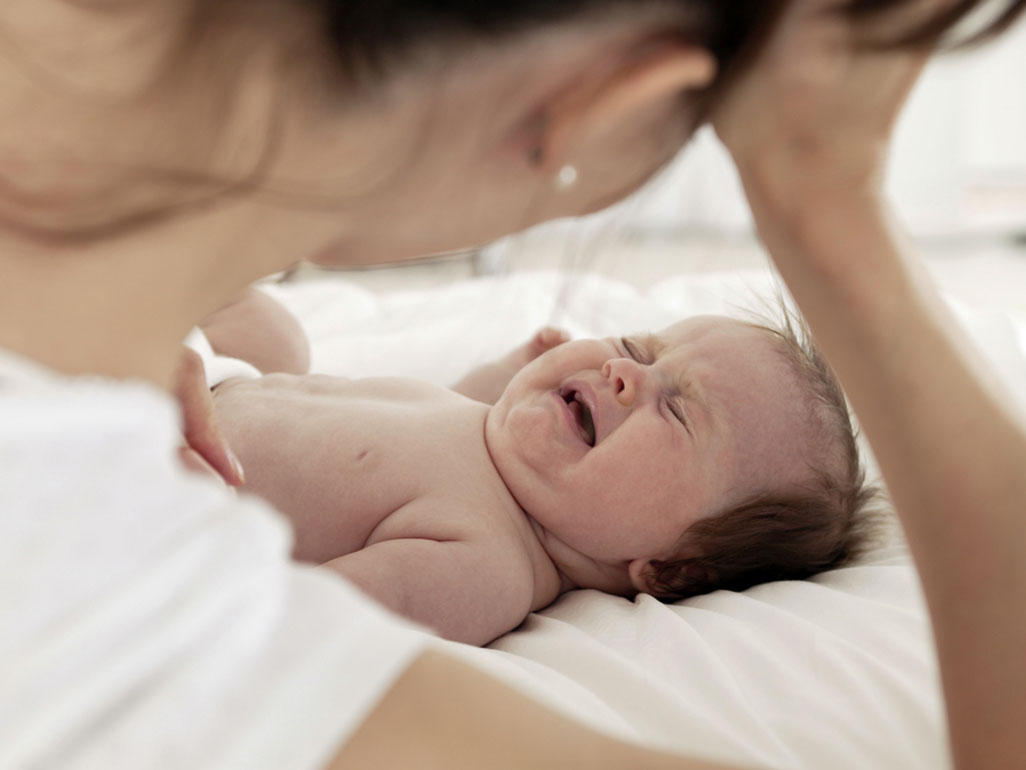
The little man has just come into this world and for him everything around is alien and incomprehensible. The only thing that is important for him now is the satisfaction of his needs and a comfortable existence.
There are many reasons for crying crumbs: hunger, a wet diaper, not comfortable temperature indoors or a banal desire to attract attention.
At first, parents are simply perplexed, what does the child want? But over time, they begin to distinguish and understand the reasons that cause crying. After all, the baby, with each “problem”, shows his emotions in the form of crying in different ways, he still cannot do otherwise. The timbre of the sound produced changes, the volume and even the intonation.
Common causes of crying babies
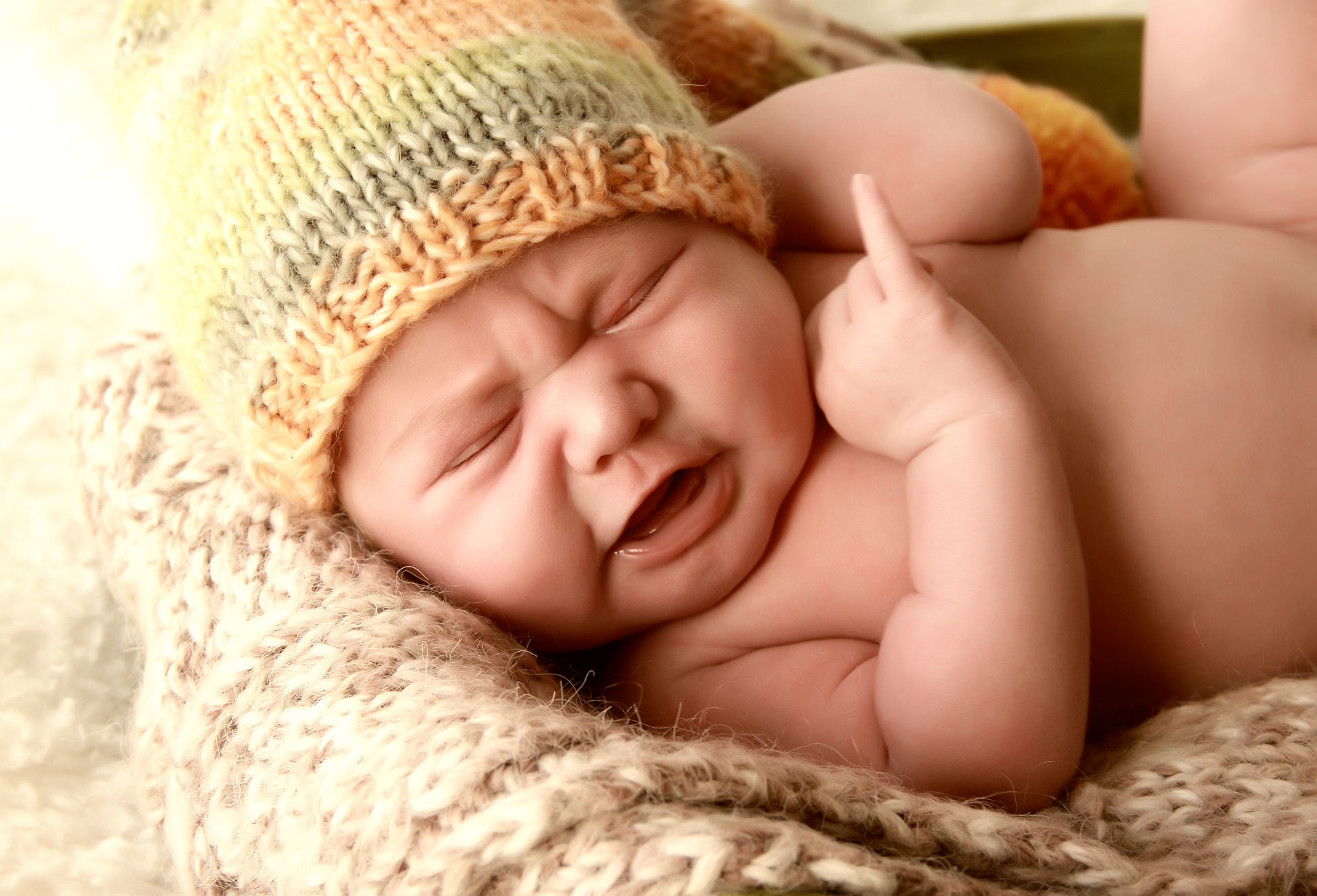
A newborn baby expresses his emotions, both positive and negative, through crying. Through it, he notifies about his feelings and needs. So, let's try to highlight the typical reasons why all newborns cry. 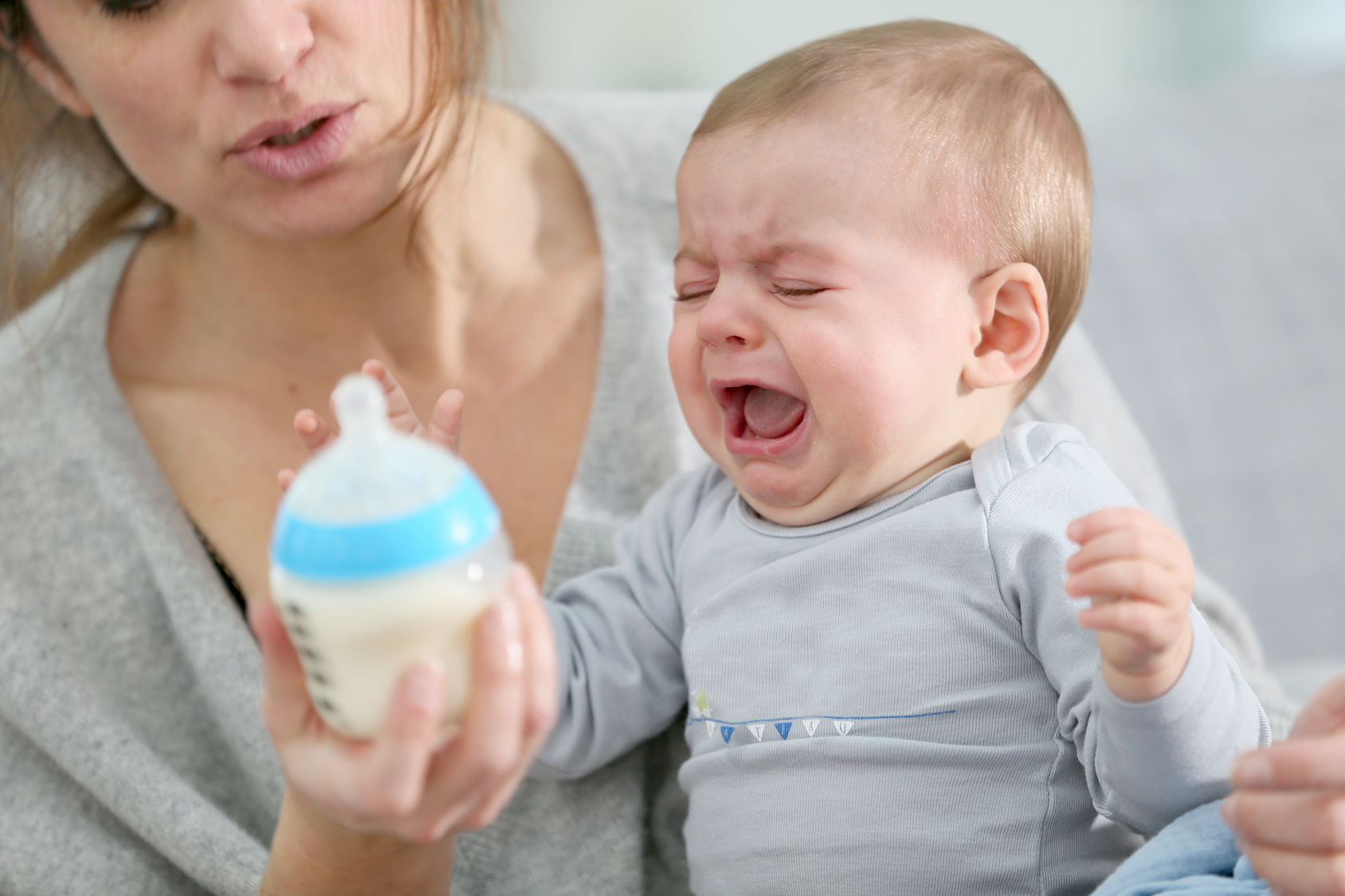
- Reason #1: Hunger. The most frequent crying is due to hunger. It is usually accompanied by reddening of the face and stretching of the arms up. In addition to saturation, the baby feels a sense of satisfaction and security, being near his mother's breast.
- Reason #2: Air. Yes, air is a fairly common cause of crying after hunger in newborns. It is swallowed during breast sucking and disturbs the baby. Therefore, after each feeding, it is necessary to keep the newborn “column”.
- Reason #3: Pain. Crying is often caused by pain. These can be colic (flatulence), an inflamed ear, stomatitis, body leakage from lying in one position, erupting teeth, and much more.
- Reason #4: Dirty diaper. Timely diaper change relieves not only from crying, but also from irritation of the skin under it. The discomfort experienced causes the newborn to call for "help".
- Reason #5: External stimuli. Heat or cold affect the baby. He feels discomfort and begins to show his "outrage" through crying.
- Reason #6: Can't poop. This problem is common among artificial children. A rather high density of feeding mixtures causes constipation in the baby.
- Reason #7: Lack of attention. There is a very close bond between mother and newborn. The baby, feeling her warmth, calms down. Therefore, very often, with the help of crying, he tries to get closer to his mother.
Baby cries in sleep
It happens that the baby is dry and fed, but cries in a dream. What can cause a baby to cry? 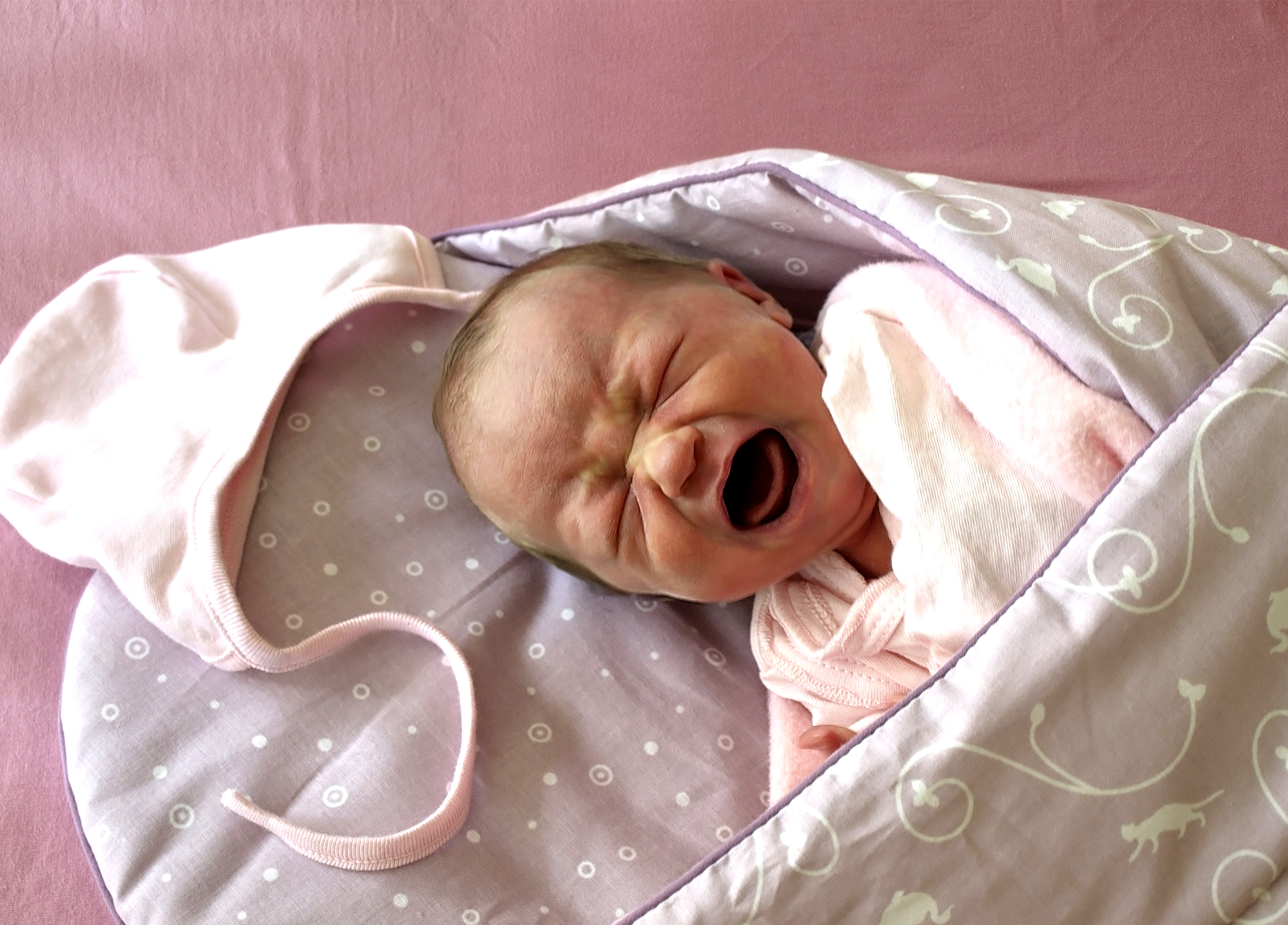
Of course, all of the above reasons can serve as a basis for crying in a dream, but most often the crumbs cry because of the experience of emotions that come in a dream.
Scientists have long proven that infants dream. It is emotional dreams that usually cause crying. An unusual event for a baby can provoke such a dream. The psyche of a newborn is just beginning to develop, and a visit to the grandmother, new faces of belated relatives, vaccination in the hospital can cause a storm of emotions that the baby will experience in a dream.
If a child's crying in a dream is not caused by painful sensations, then it is quite enough to go to the cradle and stroke the baby, gently pat on the pope, soothe with words or a lullaby. He must feel that his mother is near and she will protect him. This usually helps and calms the baby.
Baby crying while feeding
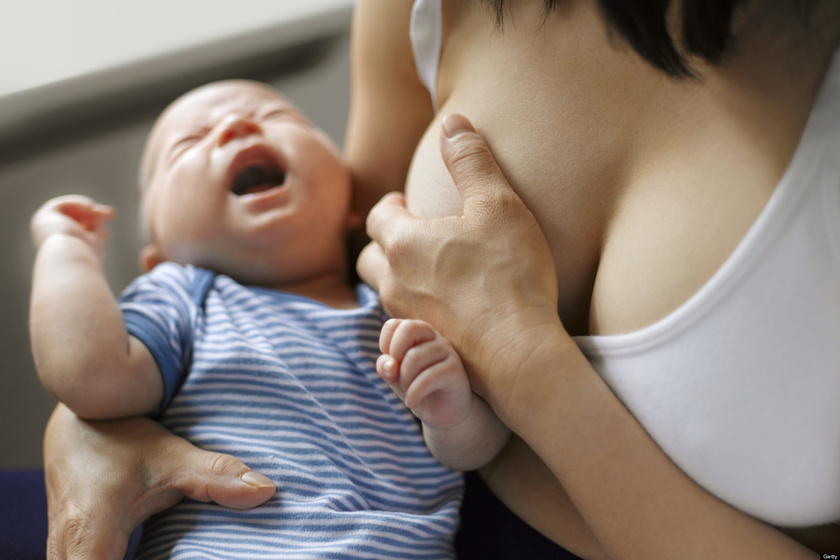 If the baby cries while eating, then there are basically four reasons for this behavior.
If the baby cries while eating, then there are basically four reasons for this behavior.
- Inflammatory process in the mouth. It could be thrush (white coating all over the mouth). It is visible to the "unaided" eye. Treatment of the disease will exclude crying during meals.
- Ear pain (otitis media). When swallowing, the baby feels strong pain and cries. You can check whether the ear is the culprit by pressing the tragus. If the ear hurts, then while pressing the child will twitch and cry even more. Contact your pediatrician, he will prescribe drops for the baby.
- Nasal congestion. This condition prevents the baby from breathing while suckling the breast. To feed the baby without crying in this situation, rinse and drip the spout.
- Pain in the abdomen. In this case, the newborn is restless, pulls the legs to the tummy. To exclude crying in this case, it is necessary to find out the cause of pain (colic, air, constipation) and eliminate it.
If the baby first actively sucks for 2-3 minutes, and then starts to cry, then the reason may be the lack of milk. If you are faced with the problem of a lack of milk, you can learn how to breastfeed in the article:
Sharp crying of the baby: causes of discomfort
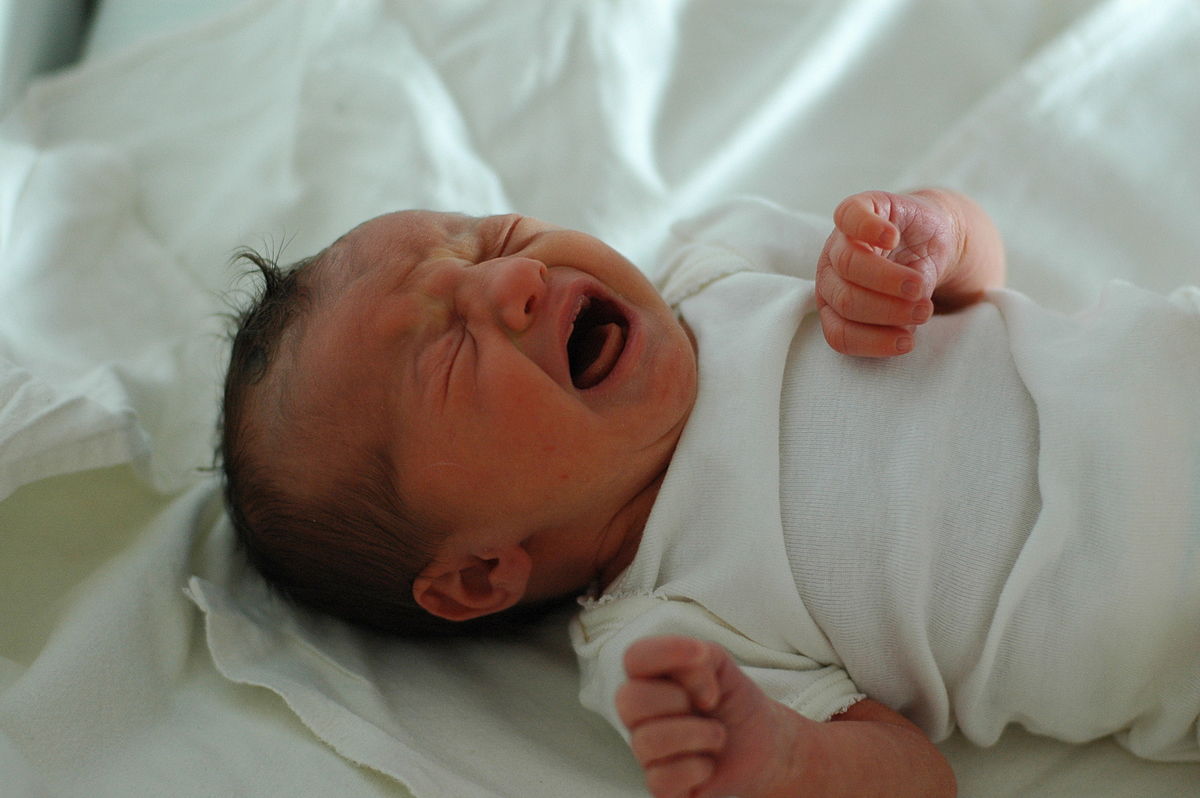
Abrupt or spontaneous crying of a newborn in the first months of life can be caused by external stimuli:
- A sudden bright light. To avoid such "tantrums" at night, use subdued lights. Do not turn on the main light with the baby if it was dark in the room before.
- Loud noise. It can be a speech, a TV, a dropped frying pan, etc. Try to protect your baby from loud noises that can scare him.
Over time, the nervous system of the crumbs matures and it stops responding with sharp crying to the above stimuli. The task of parents is to protect the newborn from external irritants and create comfortable conditions for the life of the baby.
What to do if the baby pushes and cries?
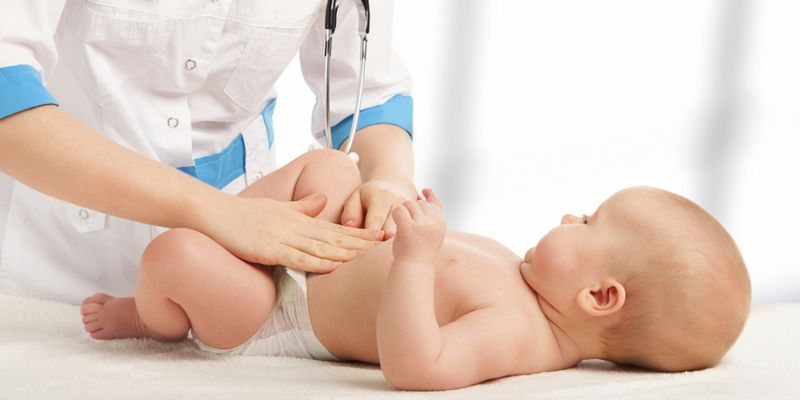 Out of all the mass possible causes manifestations of attempts and crying should pay attention to the two most common.
Out of all the mass possible causes manifestations of attempts and crying should pay attention to the two most common.
- The child has colic. Then reddening of the face joins crying and attempts.
- Constipation. Such symptoms and the absence of bowel movements (normally up to 3 months this happens 3-7 times a day) indicate constipation. As mentioned above, this is a fairly common problem for artificial babies.
For reference: If a breastfed baby does not poop for several days, but the gases leave and the baby behaves normally, then you should not worry. This is fine. Just mother's milk is completely absorbed by the child's body.
What to do and how to help the child? 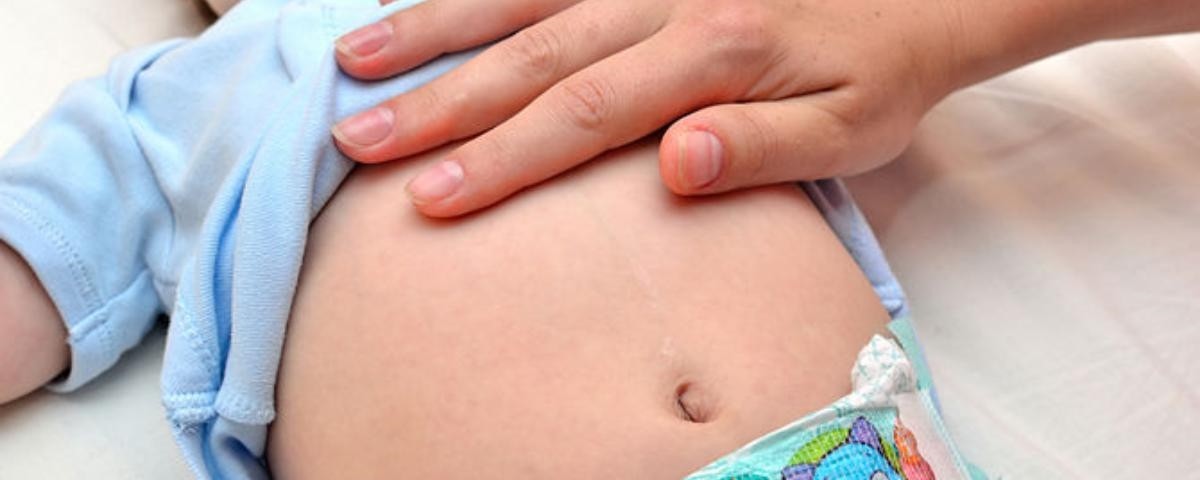 At colic. They usually begin in the first month of a child’s life and “torment” the baby for up to 3 months, while the digestive system “ripens”. You can help your little one by doing the following:
At colic. They usually begin in the first month of a child’s life and “torment” the baby for up to 3 months, while the digestive system “ripens”. You can help your little one by doing the following:
- Lay the baby on the tummy before eating (15 minutes before).
- Massage the newborn's tummy clockwise with the palm of your hand around the navel. Such circular movements with a slight pressure will help the air move "to the exit".
- A warm diaper during spasms will soothe the pain. Fold the diaper into a square and heat well with an iron. Attach a warm diaper to the baby's belly, press him with your tummy to yourself and vilify.
- It will also help reduce flatulence. Dill water or special medicines. Usually these are drops from flatulence (Kolikid, Espumizan, Bobotik, Plantex, etc.).
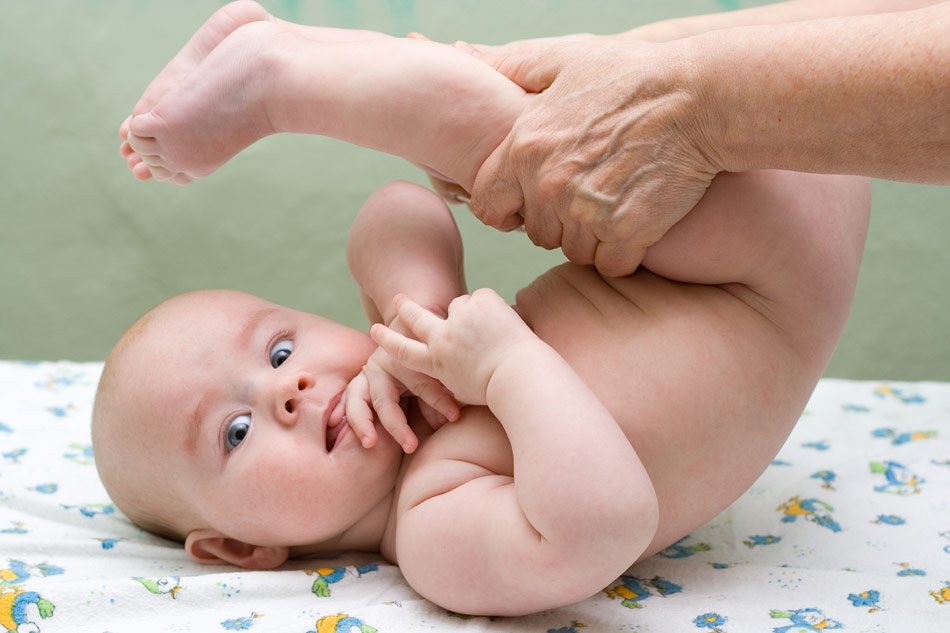
If the cause of crying and pushing is constipation, then the following tips will help mom:
- In the case of breastfeeding, reconsider your diet: it must contain fermented milk products.
- Drink your baby more often. Dill water also helps in this case.
- Do your exercises. When the child lies on his back, press his legs, bent at the knees, to the tummy and press lightly.
- Warm baths are relaxing and promote bowel movements.
- After consulting a doctor, help the child to poop. This can be done with drugs (they should be prescribed by a pediatrician) or in acute cases with an irritant. The legs of the child lying on his back are raised and a stick for cleaning the ears dipped in sea buckthorn oil, or a thermometer, is lightly pressed on the anus. This method is used in exceptional cases, when the child cannot poop on his own.
The baby cries often and a lot: alarming symptoms
Typical causes of crying are easily eliminated:
- hungry - feed;
- wet - change clothes;
- frozen - put on, etc.
After their elimination, the baby should calm down and fall asleep. If this does not happen and you have tried all possible ways to calm the baby (bath, carrying, motion sickness), then there is reason for excitement. 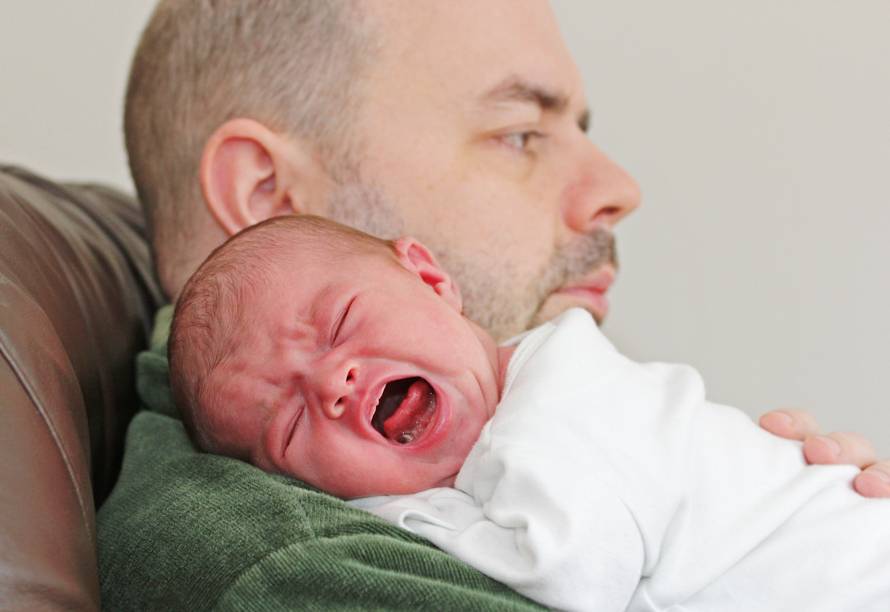
Warning symptoms that cause crying include:
- Malaise and pain. The crying of a child causes a disease: it can be colds (SARS, flu), inflammatory (skin dermatitis, sweats, otitis media, etc.) processes. In such cases, treatment is necessary.
- Bloating, constipation. The constant "impossibility" to poop indicates an improper metabolism or digestive problems. The cause of frequent constipation must be investigated in the hospital.
- Breast migraine. All children suffer from intracranial pressure, but, like adults, they tolerate it differently. Very often, sensitive babies cry in windy, rainy weather. If such bouts of crying continue for quite a long period, then contact your pediatrician.
- Teething. Such a process may be accompanied by headache, fever, strong salivation, fever. The child at this time is irritable, capricious. But as soon as the little white tooth cuts through the delicate skin of the gums, the baby will return to its normal (previous) state.
Strong crying in infants: how to react?
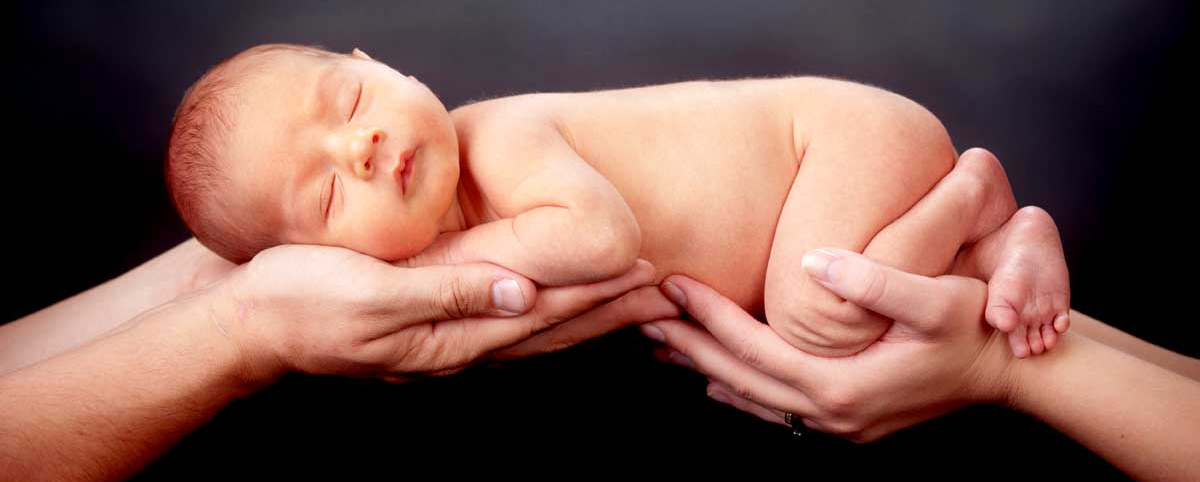 It's bad for babies to cry! The statements of grandmothers: “she will cry and stop” or “let her lungs work out” are unfounded. After all, the constant crying of a child shakes him nervous system and can cause an umbilical hernia. Therefore, it is simply necessary to respond to crying. If hunger or a wet diaper became the cause of whims, then feed and change it. Eliminate all other inconveniences that provoke crying.
It's bad for babies to cry! The statements of grandmothers: “she will cry and stop” or “let her lungs work out” are unfounded. After all, the constant crying of a child shakes him nervous system and can cause an umbilical hernia. Therefore, it is simply necessary to respond to crying. If hunger or a wet diaper became the cause of whims, then feed and change it. Eliminate all other inconveniences that provoke crying.
Take the newborn in your arms, he should feel warm and protected. Don't get irritated when the baby cries, because your emotions are being transferred to the baby. Even if you had an argument with your spouse and feel emotionally annoyed, do not take the child in your arms. First calm down and only then approach him. Otherwise, you will get a crying baby and will not know what is the reason.
The current misconception “The child will get used to hands” is not a reality, and the first three months of the hand is where it is warm, cozy and calm. Take the newborn in your arms and do not be afraid that he will get used to it.
After the first three months, the colic will pass, the sleep - walking - feeding - wakefulness will improve and the child will cry much less often and “on business”.
We find out the reasons for crying by its nature
![]() All mothers eventually begin to distinguish between the crying of their child and understand what exactly he wants. And for those mothers who are still at a loss as to why their baby is crying, we will give identification definitions for each cry.
All mothers eventually begin to distinguish between the crying of their child and understand what exactly he wants. And for those mothers who are still at a loss as to why their baby is crying, we will give identification definitions for each cry.
- hungry cry- loud, drawn out, gradually turns into a choking cry. When picked up, he begins to look for the chest, making movements with his head and arms.
- calling cry- the baby cries for a few seconds and calms down (waiting for the reaction of the parents). After 30–40 seconds, the action is repeated again. If the baby is left without attention, then the periods between crying decrease and one continuous op is obtained.
- Crying in discomfort(dirty diaper or body leakage from lying in one position) - this sound is more like a squeak, whimper and grunt. It is accompanied by fidgeting and attempts to get rid of the cause of discomfort (crawl to a dry area).
- Painful cry- loud, buoyant, of the same intensity. Mom can even hear the notes of despair in the cry of a child.
- Crying before sleep It's more like a whimper rather than a cry. These are even plaintive cries with yawns and squinting.
How to soothe a baby?
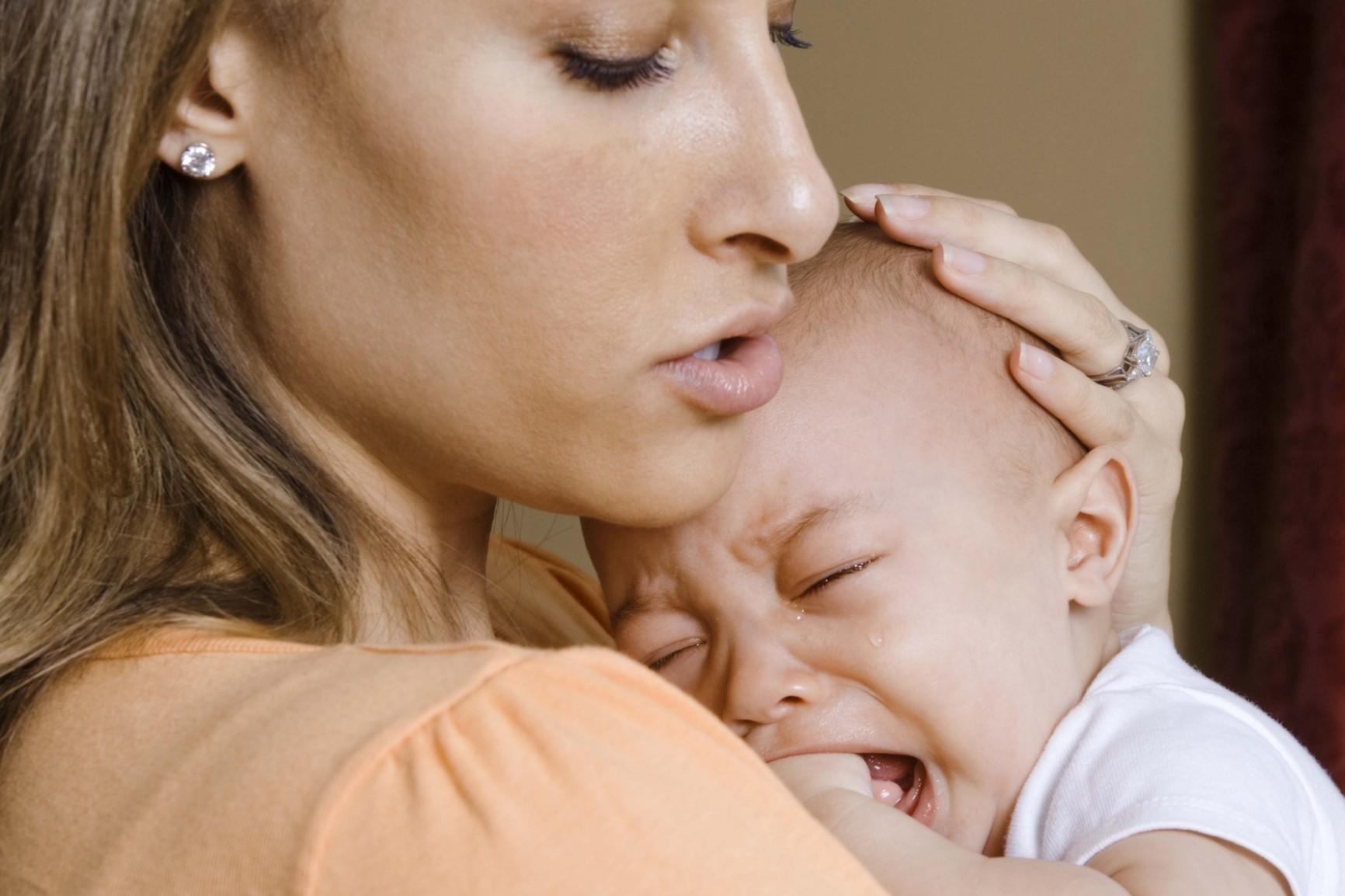
Initially, you should find out the cause of crying and eliminate it. The following will also help:
- Apply a blank. If the child takes it, then this facilitates the process of calming at times. The sucking reflex soothes the baby.
- Attach to your chest. Even if the baby is not hungry, still take him in your arms. 85% of babies calm down near the chest. Many mothers are saved this way from crying with colic.
- Take it in your arms, shake it and calm down. Very effective way calm. The baby can be downloaded or vilified with a column.
- Talk to your child. Gentle intonation has a calming effect. Sing a lullaby.
- Distract the child from the problem of a bright toy or a new object.
- Take a warm chamomile bath. She calms and relaxes.
- Take your child outside. Children love to walk and usually do not cry during a walk.
How did you comfort your child? Share your experience with young mothers in the comments.
